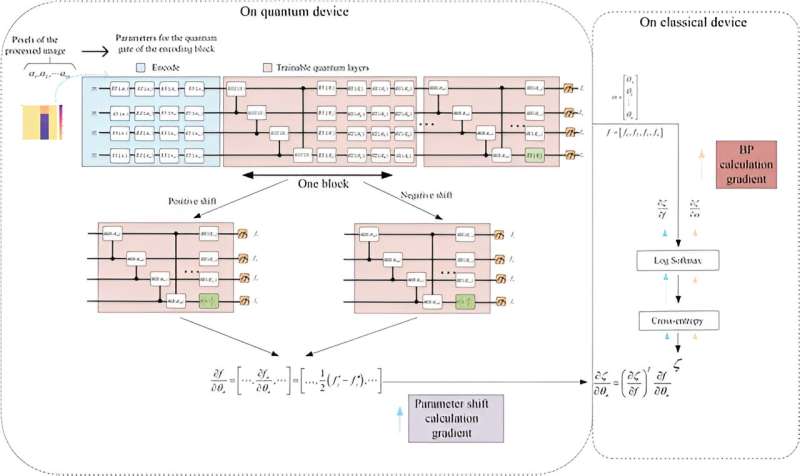This article has been reviewed according to Science X's editorial process and policies. Editors have highlighted the following attributes while ensuring the content's credibility:
fact-checked
proofread
Natural evolutionary strategy boosts quantum computing performance

A team of researchers led by Yumin Dong of Chongqing Normal University has developed a novel method to optimize parametric quantum circuits, a critical component of variational quantum algorithms. The method combines the power of gradient-free natural evolutionary strategy with gradient descent to overcome the notorious "barren plateau" problem, offering promising prospects for quantum computing and machine learning.
The research was published in Intelligent Computing.
Variational quantum algorithms have emerged as a driving force in the field of quantum computing, with applications ranging from quantum chemistry and combinatorial optimization to machine learning tasks such as information identification. However, one persistent challenge has been the barren plateau problem.
In classical optimization, gradient-based methods rely on the gradient of the objective function, which is like a slope, to guide the optimization process. However, in the realm of quantum computing, the barren plateau problem occurs when quantum circuits lack a noticeable gradient in the landscape of an optimization problem.
"Due to the nature of quantum computers, computing the gradient encounter many difficulties, such as numerous quantum computations and the accumulation of errors due to quantum noise and decoherence. These difficulties lead to the gradient vanishing problem." Without a gradient to guide optimization, the situation is like being stuck on a barren plateau, making it challenging to find a solution.
Traditional gradient-based optimization techniques are limited when dealing with barren plateaus. Prior ideas for mitigating barren plateaus, such as quantum natural gradients, and techniques for initializing parameters to avoid weak barren plateaus also have limitations.
The researchers sought to address this challenge by harnessing the power of gradient-free natural evolutionary strategies.
According to the researchers, "These strategies are expected to optimize quantum circuits in terms of the number of function evaluations and circuit size scaling. The gradient is estimated efficiently with constant evaluations, which remain unaffected by parameter count. Furthermore, these function evaluations are completely independent and can be executed in parallel. This means that these methods are suitable for high-dimensional problems".
The researchers introduced two specific methods: One, which they call NESSGD, combines natural evolutionary strategy with stochastic gradient descent, while the other, which they call NESAdaBelief combines natural evolutionary strategy with a gradient descent variant. These methods aim to optimize the parameters of parametric quantum circuits in variational quantum algorithms.
These methods were compared with methods that did not employ a natural evolutionary strategy in five classification tasks. The two new methods exhibited superior performance in achieving higher accuracy, showcasing the potential of these methods to revolutionize quantum algorithm optimization.
To make their optimization approach practical for quantum computing, the researchers explored the applicability of their evolutionary stochastic gradient descent variant under the parameter shift rule. This rule is a popular technique for obtaining parametric quantum circuit gradients. They demonstrated that the method can adapt to this rule, which paves the way for practical applications on actual quantum hardware.
The findings of this study have far-reaching implications for the future of quantum computing and its applications. The researchers said, "In the next step, we will consider combinatorial strategies for further improvement of training." The ultimate goal is to enhance the robustness of parametric quantum circuits in noisy intermediate-scale quantum hardware. "Our goal is to identify a strategy that can stably mitigate or resolve the 'barren plateau' and provide theoretical support for the widespread use of variational quantum circuits".
More information: Jianshe Xie et al, Natural Evolutionary Gradient Descent Strategy for Variational Quantum Algorithms, Intelligent Computing (2023). DOI: 10.34133/icomputing.0042
Provided by Intelligent Computing





















